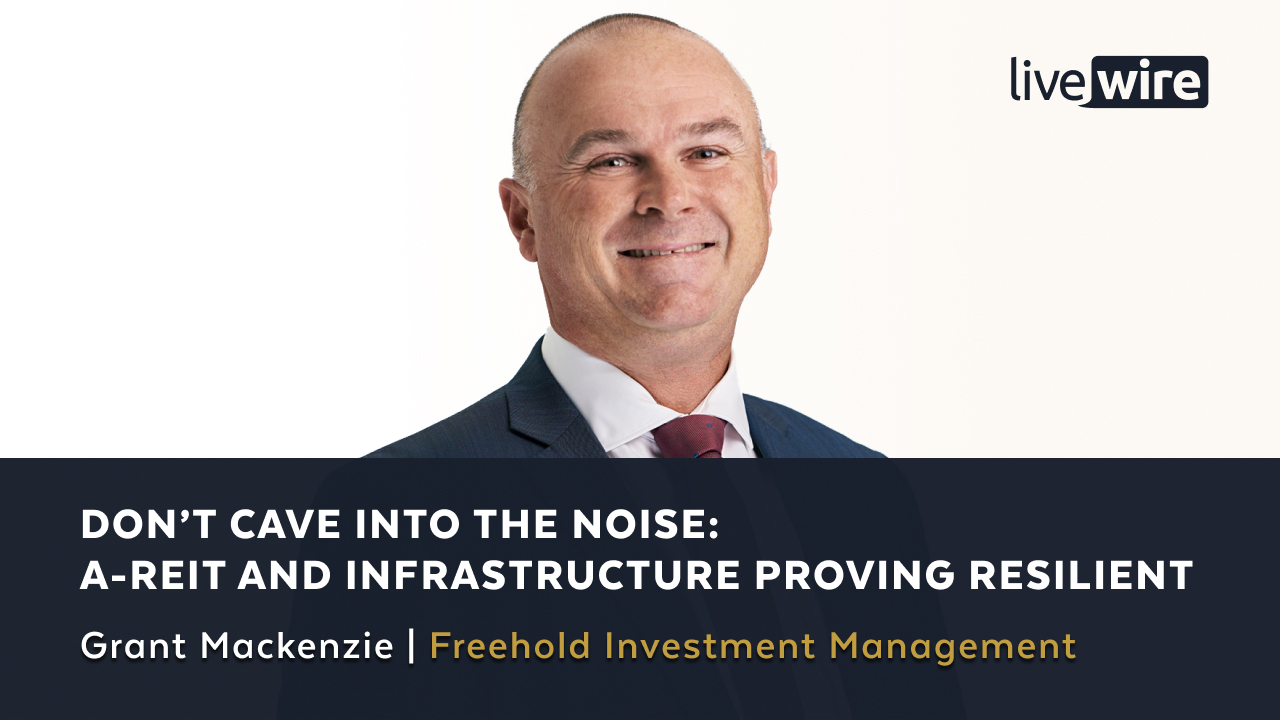Don’t cave in to the noise: A-REIT and infrastructure proving resilient
It’s only natural that investors are feeling nervous about the future of A-REIT and infrastructure sectors (outside of industrial and utility stocks).
Since the COVID-19 shutdowns, almost 50% of employed Australians have spent time working from home. And depending on the analyst quoted, air travel won’t recover to pre-pandemic levels until 2022-2024, which has flow-on implications for airports, roads, and malls.
But a closer look at the results from August reporting season suggests some written-off sectors are more resilient than expected, says Grant Mackenzie of Freehold Investment Management.
“We don’t buy the fear mongers who say that the office will become redundant.”
Here Grant breaks down the winners and losers among A-REIT and infrastructure stocks, what investors should focus on going forward, and nominates two companies offering compelling value right now.

Can you give me a high-level overview of how the A-REIT sector performed during August?
Our view is that the collective results for A-REITS have generally been a little better than what the market was anticipating. Here’s how we saw the results:
1. Cash collections – For most asset classes collections were generally better, particularly in the office sector. The one obvious caveat were retail malls, where uncertainty remains as there is still no clear visibility on how that’s going to get better.
2. Industrial/logistics – The market was expecting results in this sector to “shoot the lights out” and were not disappointed.
3. Office - Results were better than expectations, despite demand weakening and effective rents coming under pressure. Pre-results there was an awful lot of panic on share prices in the space, however, now results have been delivered there’s a realisation that the impact on the asset class is not as bad as first feared.
4. Fund managers – Continued to perform really well, reflecting maintenance of asset values and performance fees still being solid.
5. Retail – While we believe valuations for Retail assets still have much further to fall, especially malls, they are supported by the Code of Conduct (a set of good faith leasing principles for commercial tenancies between owners/operators/other landlords and tenants). We are concerned about what will happen when this is removed.
A key message comes to the fore – one we see as a solid rule of investing. Companies (like Goodman) that stick to their core capabilities are well positioned to continue to deliver for investors. These businesses are usually managed with a focus on the medium to long-term rather than getting caught up in short-term gyrations of stock price movements.
Could you break down the winners and losers in the A-REIT market?
Let’s look at the two ends of the spectrum.
Industrial/logistics businesses are without doubt the biggest winners in the current environment. Look at Goodman (ASX: GMG) who are the best of breed in their space. They have a solid business model in place that has been developed over many years. It is a defined plan on what, where and how and they ‘stick to their knitting’ so are unlikely to deliver surprises. Currently, they are reaping the benefits from this business model with their development pipelines ramping up and ‘stars aligning’ as presently, everything possible going in their favour.
Additionally, while the office sector is not necessarily a “winner”, in our view it is mispriced and we see opportunities there. Our focus is on those REITs that are well-managed, with resilient cash flows. An example is Dexus (ASX: DXS). Unlike retail malls, there are still transactions occurring and there are numerous investors globally that are seeking to invest in offices. I’m not as nervous as others that office valuations will “fall off a cliff”. We recognise they may come off a bit, but that’s already more than priced into market pricing.
Retail malls are the obvious losers given there is still so much uncertainty in that sector. Yet, the smaller neighbourhood retail centres that are underpinned by the supermarket anchors, have performed extremely well in recent times. Cash collection is showing resilience, with those centres helped by the strong sales being generated by the supermarkets. On that basis, Freehold is invested in these assets and we expect to see decent demand going forward.
There is a lot of concern about the future for office and shopping centre A-REITs. You’ve had a chance to dig into the financials of these companies and presumably speak to management. What are they telling you about the current situation and future outlook?
Office not dead!
Yes, there are some headwinds but companies are going to need space in the CBD or a centralised location for a number of reasons. The office is an essential part of any business whether for staff collaboration, engagement, morale or business culture to simply get the most out of a business and its employees. So, we don’t buy the fear mongers who say that office will become redundant. We do however accept there may be some challenges ahead.
It is important to understand that the office sector has always been a cyclical asset class. Reflective of this are the structural changes the asset class is currently experiencing. Office is a big cost on a lot of businesses. Now tenants are looking at smarter ways to better utilise the office space, such as maximising their floor space and mobilising their workforce, including incorporating the flexibility of working from home.
What’s already evident, is the widening of the gap between good quality and second-tier assets. As is the case with all office cycles, the gap between prime and secondary assets will continue to widen as risk begins to be factored in correctly within portfolios.
Retail malls must evolve
Turning our focus to retail malls, this asset class is structurally broken and must evolve. Whilst accelerated by COVID, the structural changes were occurring in a lot of markets prior to this year.
Retail malls face multiple headwinds, which revolve around cash collections, the future of bricks & mortar retail, and how they’ll adapt to e-commerce. Their current positioning as “destination places” is now challenged and not sustainable going forward. These headwinds are driving our lack of confidence in the sector, a position we have held for two years.
Rents are now so high it is difficult for some tenants to make money. Tenants have been telling landlords this for years but until recently, the landlords were always able to replace exiting tenants. That is no longer the case. The days of big retail brands continuing to open stores across the country has gone as they are no longer tolerating unprofitable stores. Landlords need to rethink how they work with tenants. Similar trends in the US and UK are indicating the market power previously held by department stores has diminished. In the US they are adapting, replacing stores with fulfilment centres.
The main take out from the three largest mall owners, Vicinity, Scentre Group and GPT results was "uncertainty". The great unknown, that no one can really answer, is "where will this land?"
There is uncertainty of cash collections and tenant loss. Both are affecting valuations and share prices, and will continue to do so.
We would not be surprised to see a 30% fall in valuations driven by this uncertainty. There’s an old adage in real estate that sings true “If you haven’t got a tenant, you don’t make money”. Investors will pay a premium for certainty.
Conversely, we’re seeing a high degree of positive sentiment around industrial REITs, especially those involved in the logistics of online shopping. Goodman, for example, is hitting record highs. Do you think this part of the market is being priced for perfection?
Industrials REITs are not cheap but we don’t see that changing for some time.
Importantly, their valuations are because of solid business models that have been proven. (See our earlier reference to Goodman.) That drives certainty of earnings. The onset of COVID has only strengthened their business case as the e-commerce thematic has seen online retailing soar as the population adapts to the current restrictions.
Investors are prepared to pay a premium for that certainty. Globally this is a current trend. We are seeing investors, pension funds and the like, trying to increase their holdings in Logistics, particularly at the expense of Retail, which will also underpin asset values.
Turning to infrastructure, could you break down the winners and losers in this market?
We have looked at Sydney Airport (ASX:SYD) and Transurban (ASX:TCL).
If you’re investing for the medium to long term, both stocks – Sydney Airport and Transurban - are good solid businesses with quality assets. However, in the short term, they have obvious headwinds from the current restrictions of the pandemic making cashflows and cash collections more volatile than usual.
Are there any fresh insights from August that are shaping your views on these businesses?
The key message, which is probably not a new insight in current times, is the need to focus on cash collection. They are both monopolistic businesses which should rebound when life gets back to normal. The problem is nobody knows when that will be. The obvious impact on these businesses when revenue comes under such adversity is the burden it places on their capital positions. We have already seen Sydney Airport raise capital, and no doubt the current market will see management continue to examine cost structures more closely.
Amid all the noise around both A-REITs and infrastructure, is there a story or opportunity that you think the market is missing?
We would suggest both an opportunity and an investment thematic.
1. Our view is that the office sector has been harshly treated. You just need to look at some of the bigger, higher-quality names. Dexus is a good example. Its share price recently fell to a low of $8.20 - about a 25% discount to NTA - and there is the funds management business to take into account that generated $70m of revenue in FY20 alone. Inherent value in that business model is higher than where its currently trading, in our view.
If we see Dexus recycle some assets into their wholesale fund or sell down some assets – the portfolio quality is pretty decent and they have a great team to manage through the current issues – it’s an opportunity.
2. For an investment thematic, consider ‘sale and leaseback for yield’. If you’re a retiree/older investor, finding a decent yield is an issue at the moment given low interest rates and cuts to dividends. Yet there are opportunities, whether in REITs or real assets, that you can “put in your bottom drawer and sleep comfortably at night” that are providing decent yields for high-quality covenants and businesses with bullet-proof cashflows.
Take a look at Waypoint REIT (ASX: WPR). It’s underpinned by a portfolio of service stations on 10 to 15-year leases, with a yield of circa 6%. This compares with current bond yields of 1.5-2.0%.
Our view is that just because Waypoint’s yield is backed by real estate investors get nervous. Yet the covenants that you’re investing into and cashflows are pretty strong – there’s an inherent mismatch between debt and equity given the quality of covenants that are backing the distributions.
Another example is Telstra (ASX:TLS) who like many good businesses have substantial real estate assets on their balance sheet. They are currently “cashing in” on their quality of covenant, undertaking the sale and leaseback of those assets in the view that they can get a better return out of recycling some of that money into the business rather than having it tied up in real estate. Similarly, Wesfarmers (ASX: WES) undertook a program of sale and leaseback of Bunnings sites many years ago and it is part of Charter Hall’s current strategy.
Lastly, can you name one A-REIT and one infrastructure stock you believe offer the most value right now?
For A-REITs we’d pick Dexus (ASX: DXS). The company has challenges as office is slowing but it’s a cyclical asset class. It will evolve and change and businesses will modify how they occupy offices but the asset class is not dead!
For infrastructure, at current prices Sydney Airport (ASX: SYD) offers deep value if investors are prepared to take a long term view. We know the borders will re-open and international traffic will return; what is uncertain is the timing. However, patient investors will be rewarded when traffic recovers and subsequent revenues from its aeronautical, retail and parking divisions soar.
Freehold’s focus is on Australian core listed property and infrastructure securities that demonstrate sustainable and predictable cash flows underpinned by long term contracts to high-quality counterparties.
Not already a Livewire member?
Sign up today to get free access to investment ideas and strategies from Australia’s leading investors.
3 topics
10 stocks mentioned



